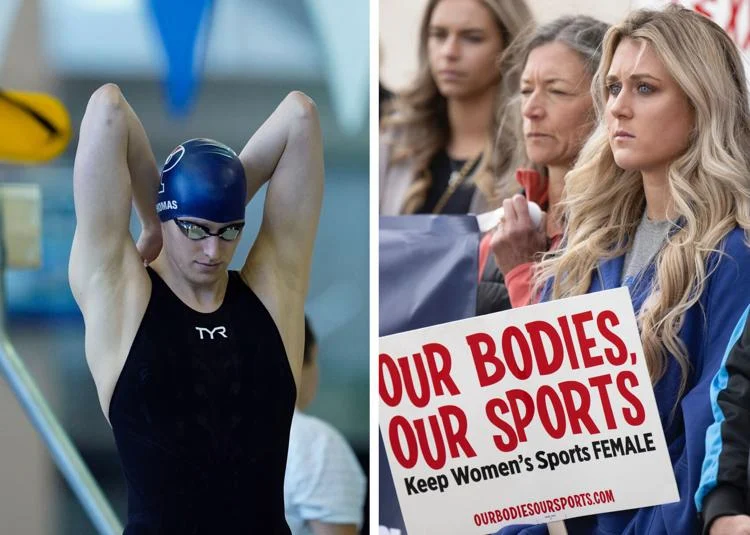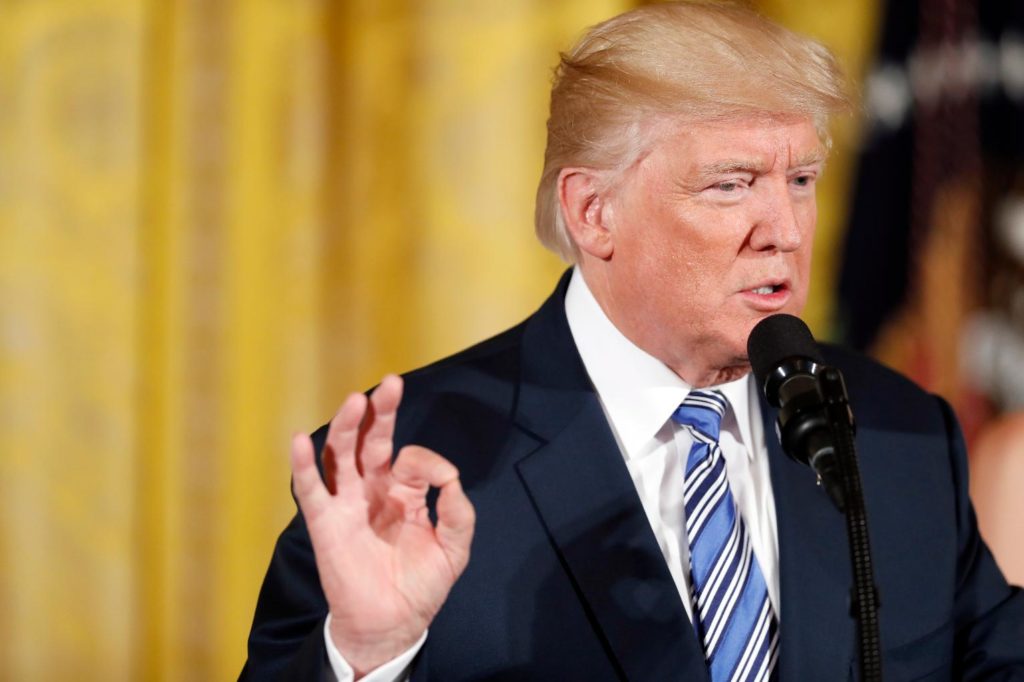Republican governors ask Biden administration to rescind Title IX guidance

Twenty-five of the nation’s 26 Republican governors have asked the Biden administration to shelve its intent to expand Title IX protections to transgender athletes. The letter, led by the signature of Mississippi Gov. Tate Reeves, says the U.S. Department of Education’s proposed regulation should be withdrawn pending litigation that could be addressed by the U.S. Supreme Court. “The Department’s proposed regulation would attempt to coerce compliance with an uncertain, fluid, and completely subjective standard that is based on a highly politicized gender ideology,” the letter reads. The letter comes as the public comment period ends Monday on a proposed revision to Title IX that would ban state and local governments from prohibiting transgender students from participating on sports teams aligned with their gender identity. Title IX was created to increase opportunities for female athletes. Federal funds can be withheld from those found to be in violation. The law, which was passed in 1972, prohibits discrimination based on sex for school districts, universities, museums, and other educational institutions that receive federal funds. “Compelling a subjective, athlete-by-athlete analysis controlled by a student’s self-identified ‘gender identity’ enforced under threat of Department retribution affords no clarity,” the letter reads. “It does the opposite. This ‘fluid’ subjective standard ensures chaos and confusion in schools and will no doubt result in protracted and disruptive litigation.” Twenty-one states prohibit transgender students from participating on sports teams that do not align with their biological sex at birth, according to the Movement Advancement Project that tracks state policies. The letter was signed by Alabama Gov. Kay Ivey, Alaska Gov. Mike Dunleavy, Arkansas Gov. Sarah Sanders, Florida Gov. Ron DeSantis, Georgia Gov. Brian Kemp, Idaho Gov. Brad Little, Indiana Gov. Eric Holcomb, Iowa Gov. Kim Reynolds, Missouri Gov. Mike Parson, Montana Gov. Greg Gianforte, Nebraska Gov. Jim Pillen, Nevada Gov. Joe Lombardo, New Hampshire Gov. Chris Sununu, North Dakota Gov. Doug Burgum, Ohio Gov. Mike DeWine, Oklahoma Gov. Kevin Stitt, South Carolina Gov. Henry McMaster, South Dakota Gov. Kristi Noem, Tennessee Gov. Bill Lee, Texas Gov. Greg Abbott, Utah Gov. Spencer Cox, Virginia Gov. Glenn Youngkin, West Virginia Gov. Jim Justice, and Wyoming Gov. Mark Gordon. The signature of Vermont Republican Gov. Phil Scott is not on the letter. Republished with the permission of The Center Square.
25 GOP governors ask Biden administration to hit pause on broader clean water rule

Twenty-five Republican governors oppose a revised federal rule regulating U.S. waterways, citing uncertainty from an undecided U.S. Supreme Court case related to the rule. The governors sent a letter to the Biden administration on Monday asking it to delay the implementation of the revised Waters of the United States rule since the U.S. Supreme Court is currently considering Sackett v. EPA. The revised WOTUS rule, released on Dec. 30, reinstates pre-2015 water protections under the federal Clean Water Act. The rule was scaled back under the Trump administration, which triggered lawsuits from environmental groups. “The substance of the rule hinders State governments as we seek to give clarity and consistency to businesses, farms, and individuals regarding the regulatory framework for water,” the 25 GOP governors wrote. “The broad definitions used in the 514- page document only add to the confusing and complicated history of WOTUS. In fact, it appears that the EPA is seeking to regulate private ponds, ditches, and other small water features.” The U.S. Environmental Protection Agency said in December the revised rule applies to “traditional navigable waters, the territorial seas, interstate waters, as well as upstream water resources that significantly affect those waters.” “When Congress passed the Clean Water Act 50 years ago, it recognized that protecting our waters is essential to ensuring healthy communities and a thriving economy,” EPA Administrator Michael Regan said in a statement. “Following extensive stakeholder engagement, and building on what we’ve learned from previous rules, EPA is working to deliver a durable definition of WOTUS that safeguards our nation’s waters, strengthens economic opportunity, and protects people’s health while providing greater certainty for farmers, ranchers, and landowners.” The governors also questioned the timing of the new rule, given ongoing inflation. “Another burdensome and overbroad regulation from the federal government could not come at a worse time for America,” they wrote. “Having already squandered much of America’s energy independence, you should not increase costs for consumers by tying up energy production with even more red tape.” Environmental groups praised the Biden administration’s revised WOTUS rule. “This comes at a time when we’re seeing unprecedented attacks on federal clean water protections by polluters and their allies,” Jon Devine, director of federal water policy for the Natural Resources Defense Council, said in a statement last month. “While the nation still has significant work to do to fully protect important waters, it’s encouraging to see the country taking a step in the right direction to protect the waters we need for everyone’s health and the environment.” The letter was signed by Idaho Gov. Brad Little, Alabama Gov. Kay Ivey, Alaska Gov. Mike Dunleavy, Arkansas Gov. Sarah Sanders, Florida Gov. Ron DeSantis, Georgia Gov. Brian Kemp, Indiana Gov. Eric Holcomb, Iowa Gov. Kim Reynolds, Mississippi Gov. Tate Reeves, Missouri Gov. Mike Parson, Montana Gov. Greg Gianforte, Nebraska Gov. Jim Pillen, Nevada Gov. Joe Lombardo, New Hampshire Gov. Chris Sununu, North Dakota Gov. Doug Burgum, Ohio Gov. Mike DeWine, Oklahoma Gov. Kevin Stitt, South Carolina Gov. Henry McMaster, South Dakota Gov. Kristi Noem, Tennessee Gov. Bill Lee, Texas Gov. Greg Abbott, Utah Gov. Spencer Cox, Virginia Gov. Glenn Youngkin, West Virginia Gov. Jim Justice, and Wyoming Gov. Mark Gordon. Republished with the permission of The Center Square.
Donald Trump’s unprecedented hands-on messaging carries risks

For the third time in six months, President Donald Trump is on the hunt for a new communications director. But in practice, the job is filled. It’s Trump who’s the White House’s leading expert and the final word on what and how he communicates with the public. Despite decrying most negative media coverage as “fake news” and personally insulting members of the media, he has inserted himself into the White House’s press operations in an unprecedented fashion for a president. Trump has dictated news releases and pushed those who speak for him to bend the facts to bolster his claims. He has ignored the advice of his legal team and thrown out carefully planned legislative strategies with a single 140-character tweet. His direct, hands-on style helped him win the White House and still thrills his supporters. It also, however, poses increasing political and potentially legal risks. The clearest example is his involvement in crafting a statement for son Donald Jr. about a meeting with a Kremlin-connected lawyer. That declaration was quickly proven erroneous and raised questions about whether the president was trying to cover for his son. Trump has struggled to find a communications adviser that meets his approval. His first, Mike Dubke, stayed behind the scenes and never clicked with Trump, leaving after three months. Then Sean Spicer, Trump’s oft-beleaguered press secretary, took on the communications director job as well. He resigned both posts last month when Trump brought in hard-charging New York financier Anthony Scaramucci. Scaramucci lasted only 11 days before being fired in the aftermath of an expletive-filled interview. A fourth candidate for the post, campaign spokesman Jason Miller, was named to the job during the transition but turned it down days later, citing a need to spend time with his family. More recently there have been some informal internal conversations about an increased communications role for White House aide Stephen Miller, according to an administration official who was not authorized to discuss private talks by name and requested anonymity. Those talks are still seen as preliminary. Miller recently clashed with some reporters over immigration policy at a contentious press briefing. This past week, as White House staffers readied a statement accompanying Trump’s signature on legislation approving toughened sanctions on Russia — a bill Trump criticized — word came down that the president wanted to add some off-topic language into the statement. That’s according to two officials familiar with the matter who spoke on condition of anonymity because they were not authorized to publicly talk about internal discussions. “I built a truly great company worth many billions of dollars,” the new section read. “That is a big part of the reason I was elected. As president, I can make far better deals with foreign countries than Congress.” That personal and boastful rhetoric is a far cry from the formal language normally found in presidential statements. It also appeared aimed at angering the same lawmakers he will need if he wants to pass any major legislation. “All presidents are their own best messengers,” said Ari Fleischer, press secretary for President George W. Bush. Fleischer said that Bush, too, would at times get involved with the White House press shop. Fleischer noted there was always a safety net of advisers at work. That does not appear to exist around the current president — particular around his Twitter account. “The lesson for this president is that it’s perfectly fine to be involved and to, at times, go around the mainstream media with Twitter,” Fleischer said. “But he needs to tweet smarter.” Corralling the president’s impulses is a challenge that now falls to new White House chief of staff John Kelly, a four-star Marine general tasked with straightening out an unruly West Wing. But many Trump allies don’t believe he’ll alter his ways. “The reality is President Trump is sitting in the Oval Office,” said Sam Nunberg, a former campaign staffer. “And before that, he was a mogul with a business that spanned continents. He did it his way. He’s not going to change. It got him where he is and it will keep him where he is.” Trump has long considered himself his own best spokesman and cares deeply about his public perception. While a budding real estate magnate in New York in the 1980s and 1990s, he was known to call reporters to plant anonymously sourced scoops about himself. He vaulted to national stardom with “The Apprentice” and micromanaged aspects of his appearances, including his hair and lighting. During the 2016 campaign, Trump was known to obsess over single images in a commercial or the font for an ad. As president, he frequently has raged about his communications staff, blaming them for White House’s stumbles while almost never taking responsibility himself. An avid consumer of cable news, Trump scolds surrogates when he thinks they are not adequately defending him on television. His frequently shifting positions also challenge his staffers, who have grown to be fearful of answering basic questions about the president’s beliefs for fear of later being contradicted, according to more than a half dozen White House officials and outside advisers speaking on the condition of anonymity to discuss private conversations. And the president has pushed staff to defend untruths, including when he ordered Spicer, in Spicer’s first White House briefing, to claim that the size of Trump’s inauguration crowd was larger than his predecessor’s, according to three White House officials and outside advisers familiar with the encounter. More untruths have followed. In March, Trump tweeted without evidence that President Barack Obama had wiretapped Trump Tower. And soon after firing FBI Director James Comey, Trump tweeted a warning that Comey had better hope there were no tapes of their White House conversations. There weren’t. Another statement has received bipartisan condemnation and could face scrutiny from investigators probing possible collusion between Trump’s campaign and Russian officials. As news broke last month that Trump Jr. had met with Russians in June 2016, the president’s eldest son released a statement


